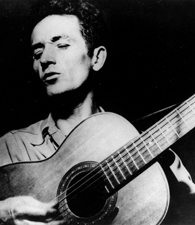Woody Guthrie was a folk music master. During his career, he gave the world more than 1,000 songs, including notable classics like “This Land Is Your Land,” and the “Dust Bowl Ballads.” Although his peak creative period lasted only about nine years, his music has endured for decades.
Woody Guthrie’s Early Days
Woodrow Wilson Guthrie was born on July 14, 1912, to two musically inclined parents in Okemah, Oklahoma. His father taught him Scottish folk tunes, and Indian and Western songs.
In 1920, Okemah became the site of a prosperous oil boom, but just as quickly as the town flourished, the oil dried up. The local economy had a dramatic reversal, and its inhabitants were left “busted, disgusted, and not to be trusted,” according to the Woody Guthrie Foundation. Experiences like these help shape Woody’s perspective, and eventually his music.
Woody was plagued by other more personal tragedies. One of his sisters died in a fire. Another fire claimed his family home. His mother was committed to an asylum for mental health issues.
Despite these struggles and others, he began building his reputation as a musician, playing whatever instrument was necessary, including bass fiddle, the spoons and straws. He was also quite skilled at the harmonica, despite playing it backward, with the bass notes on the right instead of the left.
Sources in this Story
- The Woody Guthrie Foundation: Woody Guthrie
- PBS: Woody Guthrie
- Library of Congress: This land is your land
- NPR: The 100 most important American musical works of the 20th century
- Rolling Stone: Dust Bowl Ballads
- The New York Times: Funny, Woody, You Don’t Look Klezmer
- Today.com: Rare Woody Guthrie bootleg album surfaces
Guthrie’s Music
Guthrie’s music was largely influenced by his upbringing in rural Oklahoma during the Depression years. He led a “hobo life-style,” despised greed and had a fondness for “America’s everyday folk.”
After Irving Berlin wrote “God Bless America,” Guthrie responded with “This Land is Your Land” because he felt Berlin’s number didn’t fully address “the lop-sided distribution of land and wealth that he was observing and had experienced as a child,” according to the Library of Congress.
“This Land Is Your Land” made NPR’s list of the “100 most important American musical works of the 20th century.” Listen to a more detailed story of the song, and hear the music at NPR’s web site.
When the Dust Bowl crisis hit the United States, Woody Guthrie became the spokesman for the times. The “Dust Bowl Ballads” were Guthrie’s form of blues music. California became the place farmers thought they should go.
In his songs, “Guthrie captures the hopelessness of the crop and bank failures, the rigors of the journey west and the crushing disappointment that ensued when California offered a reality nearly as harsh as the land left behind,” writes Anthony DeCurtis in Rolling Stone.
The Rest of the Story
On October 3, 1967, Woody Guthrie died of Huntington’s disease. He was posthumously inducted into the Songwriters’ Hall of Fame, the Nashville Songwriters Foundation, Inc. and the Rock and Roll Hall of Fame. In 1996, he was awarded the Lifetime Achievement Award by the North American Folk Music and Dance Alliance.
While living in Coney Island with his second wife, who was the daughter of a Yiddish poet, Woody wrote about the Holocaust, Hanukkah and his neighborhood, “where the halvah meets the pickle, where the sour meets the sweet.” Years later, Guthrie’s daughter asked a New York band, the Klezmatics, to compose melodies for several of Guthrie’s verses written during this time. According to The New York Times, the end product was “Holy Ground: The Jewish Songs of Woody Guthrie,” although not all the songs were about Jewish topics.
Guthrie’s family long assumed that he had never recorded any of his songs in front of a live audience, but they were pleasantly surprised one day in 2001 when a package containing “an early bootleg” recording arrived at the Woody Guthrie Archives.
According to Today.com, it took one year to find a machine that could play the sound reel, and audio restoration experts had plenty of work to do to improve the quality of the recording.
The American Folklife Center at the Library of Congress holds a large online collection of Guthrie’s essays, sketches and songs.
This article was originally written by Lindsey Chapman; it was updated June 2, 2017.











